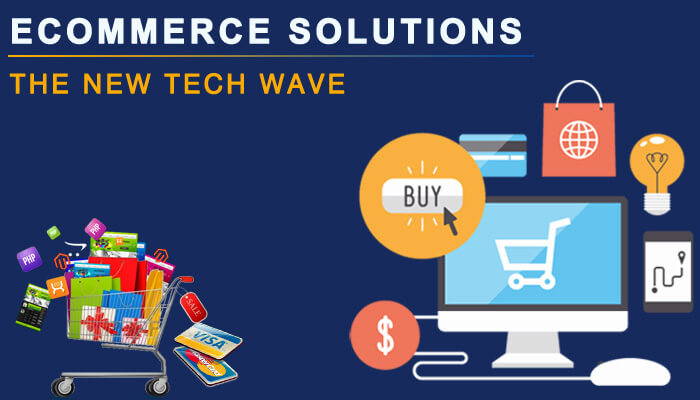
The rise of e-commerce has revolutionized the way we shop, with consumers increasingly turning to online retailers for convenience, selection, and competitive pricing. In fact, e-commerce sales are projected to reach over $6 trillion by 2023, making it a critical channel for retailers looking to stay competitive in the digital age.
So what are the key e-commerce solutions that are driving this growth, and how are they transforming the retail landscape? Let’s take a closer look.
Mobile Commerce
With more consumers using their smartphones to shop online than ever before, mobile commerce (or “m-commerce”) has become a critical component of e-commerce strategy. Retailers must ensure their websites and checkout processes are optimized for mobile devices to provide a seamless experience for customers.
Personalization
Personalization is becoming increasingly important in the e-commerce world, with consumers expecting retailers to provide tailored product recommendations, promotions, and content based on their individual preferences and behaviors. Retailers are leveraging data and artificial intelligence (AI) to create personalized experiences that build loyalty and increase sales.
Social Commerce
Social media platforms like Instagram, Facebook, and Pinterest are increasingly becoming e-commerce marketplaces in their own right, with retailers able to sell products directly through their social media channels. This creates a seamless shopping experience for consumers and provides retailers with a new channel for reaching potential customers.
Subscription Services
Subscription-based e-commerce services like Birchbox, Dollar Shave Club, and Amazon Prime have exploded in popularity in recent years. These services provide customers with a regular supply of products they use regularly while providing retailers with a predictable revenue stream.
Augmented Reality (AR)
Augmented reality technology is enabling retailers to provide customers with immersive shopping experiences, allowing them to see how products would look in their homes or on their bodies before making a purchase. This can help reduce returns and increase customer satisfaction.
Voice Commerce
As voice-activated assistants like Amazon’s Alexa and Google Assistant become more common in homes, voice commerce is emerging as a new e-commerce channel. Retailers are developing voice-activated shopping experiences that allow customers to order products through their smart speakers.
Artificial Intelligence (AI) and Machine Learning (ML)
Artificial intelligence and machine learning are transforming e-commerce by enabling retailers to automate and optimize various processes, from inventory management to customer service. Retailers can use AI and ML to analyze customer data and behavior, personalize product recommendations, and identify new sales opportunities.
Omnichannel Retail
Omnichannel retail refers to the seamless integration of online and offline channels, creating a unified shopping experience for customers. Retailers are leveraging technology to connect their physical stores, E-Commerce Solutions websites, mobile apps, and social media channels to provide customers with a consistent brand experience across all touchpoints.
Same-Day Delivery and Pickup
Same-day delivery and pickup options are becoming increasingly popular with consumers who want their products quickly and conveniently. Retailers are partnering with third-party logistics providers or developing their own delivery infrastructure to offer same-day delivery and pickup options to customers.
Social Responsibility and Sustainability
As consumers become more socially and environmentally conscious, retailers are prioritizing social responsibility and sustainability in their e-commerce operations. Retailers are implementing sustainable packaging solutions, supporting ethical supply chains, and donating to charitable causes to appeal to customers who value these issues.
Chatbots and Virtual Assistants
Chatbots and virtual assistants are becoming increasingly common in e-commerce, providing customers with 24/7 support and assistance. These AI-powered tools can help customers navigate the online shopping experience, answer common questions, and even provide personalized recommendations.
Influencer Marketing
Influencer marketing has become a powerful tool in e-commerce, with retailers partnering with social media influencers to promote their products to their followers. Influencers can help increase brand awareness, drive traffic to E-Commerce Solutions sites, and boost sales.
Cryptocurrency Payments
Cryptocurrencies like Bitcoin and Ethereum are gaining acceptance as a form of payment in e-commerce, with retailers offering customers the option to pay using digital currencies. This provides customers with an alternative payment method that offers greater security and privacy than traditional payment methods.
Live Video Shopping
Live video shopping is a relatively new trend in e-commerce, enabling retailers to showcase their products in real-time through live-streaming videos. Customers can interact with the host, ask questions, and purchase products directly through the live video feed.
Dynamic Pricing
Dynamic pricing is a pricing strategy that involves adjusting the price of a product in real-time based on factors like supply and demand, competitor pricing, and customer behavior. Retailers can use dynamic pricing algorithms to optimize prices and maximize revenue.
By keeping up with these e-commerce trends and innovations, retailers can continue to improve the online shopping experience for customers and stay ahead of the competition in an increasingly crowded market.
In conclusion, e-commerce solutions are transforming the retail landscape, offering retailers new opportunities to engage with customers and increase sales. By embracing these technologies and trends, retailers can create a seamless, personalized, and sustainable shopping experience that meets the needs and expectations of modern consumers.